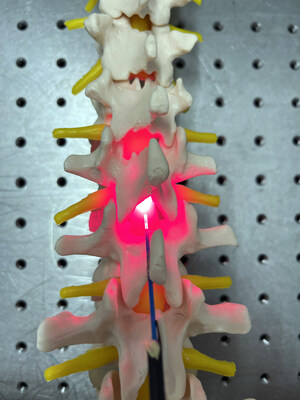Research Conducted by the University of Birmingham Finds New Antimicrobial Coating Could be Key in Fight Against Hospital-Acquired Infections
BIRMINGHAM, England, Aug. 28, 2019 /PRNewswire/ -- Scientists at the University of Birmingham have created an antimicrobial coating for steel surfaces which has proven to rapidly kill bacteria that cause some of the most common hospital-acquired infections.
Developed by researchers at the University of Birmingham, patented by University of Birmingham Enterprise, and to be commercialised by a new company NitroPep, the coating – also called NitroPep - has been heralded as a new tool in the fight against the spread of infection.
Working with the Royal Centre for Defence Medicine and the Royal Navy, the researchers conducted a trial which saw NitroPep coated on steel surfaces – including door handles, an operating theatre and part of a communal toilet – on board a Royal Fleet Auxiliary ship.
Both the surfaces coated in NitroPep, and 'control' surfaces that were not treated with the coating, were subject to standard daily cleaning regimes while the ship was at sea for an 11 month period.
The surfaces were swabbed on a weekly basis and the results were then analysed in the laboratory at the University of Birmingham.
The results showed that the coating was effective against five different bacteria that are responsible for hospital-acquired infections – Staphylococcus aureus, Staphylococcus epidermidis, Enterococcus, Pseudomonas aeruginosa and Escherichia coli.
The research also showed that the coating killed bacteria within 45 minutes – far more rapidly than currently commercially available technologies which do not have a significant effect on bacteria until up to 24 hours.
Published in Materials Science and Engineering C: Materials for Biological Applications, the research was carried out by scientists at the University of Birmingham's Institute of Microbiology and Infection and School of Chemistry; the Royal Centre for Defence Medicine; the University of Nottingham; and Queen Elizabeth Hospital Birmingham which is part of University Hospitals Birmingham NHS Foundation Trust.
Dr Felicity de Cogan, Royal Academy of Engineering Enterprise Fellow at the University of Birmingham and Chief Scientific Officer at NitroPep, said: "Despite increased sterilisation and education campaigns, hospital acquired infections have not been eradicated and the accumulation of bacteria on frequently touched surfaces is key in the transmission of infection.
Graeme Forster, Managing Director of NitroPep, said: "NitroPep is a novel, cost effective, and cutting-edge technology for bonding antimicrobial actives onto various surfaces which we believe is the future solution to a global problem."
Notes to Editors:
About University of Birmingham Enterprise
University of Birmingham Enterprise provides a full technology transfer service for the University of Birmingham, and provides enterprise training, funding, and laboratory space for innovators from the University. More information at www.birmingham.ac.uk/enterprise.
About NitroPep
The technology allows for long-term application (9-10 years) of an antimicrobial agent to metallic and plastic "high-touch" environmental surfaces that can reduce person-to-person transmission of infectious agents. Research is also being performed to apply the technology to ceramics, rubber and silicone.
The company is currently targeting the following sectors: door hardware and handrails in healthcare facilities and public venues such as airports, railroad stations, aircraft seat back tray tables, cruise ships; key high-touch surfaces on hospitals beds and other medical equipment; air and water filtration systems; plumbing fixtures in bathrooms, public lavatories (including toilet seats) and kitchens.
For commercial enquiries contact Jake Requard, e: [email protected], m: +1-919-889-0917.
SOURCE University of Birmingham Enterprise

Related Links
WANT YOUR COMPANY'S NEWS FEATURED ON PRNEWSWIRE.COM?
Newsrooms &
Influencers
Digital Media
Outlets
Journalists
Opted In





Share this article